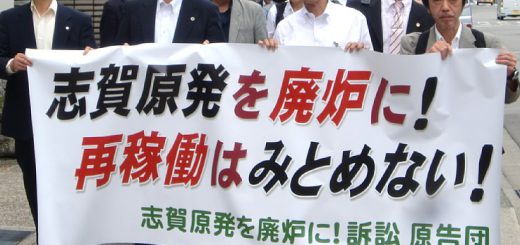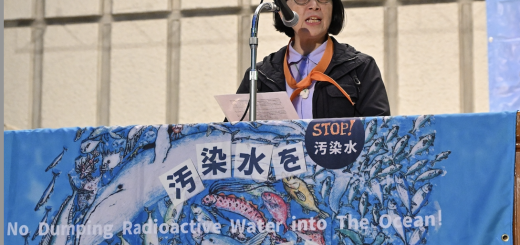Protest Against Restart of the Tokai Reprocessing Plant Nuke Info Tokyo No. 81
Three years have passed since the fire and explosion at the Japan Nuclear Cycle Development Institute (JNC)’s bituminization facility at the reprocessing plant in Tokai-mura, Ibaraki Prefecture. Ibaraki Prefecture and Tokai-mura agreed to the re-start of the plant, and the company – formerly the Power Reactor and Nuclear Fuel Development (PNC) – began the operation of the plant on 20 Nov. 2000.
Before giving the green light, the Prefecture consulted the Ibaraki Nuclear Council, and the Council had a meeting for the first time in 5 years. They only met three times and in total spent a mere seven hours discussing the matter. Obviously they had already made up their minds to recommend the re-start even before having these token meetings.
Our group, the Ibaraki Action Coalition Against Nuclear Power, pointed out to the Council problems associated with the aging of the Plant, the worldwide trend of withdrawal from reprocessing, and advised the Council on the municipality’s right not to accept the national policy calling for the re-start of the plant. We also asked for clarification of the Council’s responsibility and demanded that the Council dissolve immediately if it could not clarify its obligation. However, the Council ignored our requests and approved the re-start of the plant.
We immediately submitted a request to the governor and asked for a written response. We pointed out that since some of the members of the Council have personal interests, the members should be re-appointed. We also asked if the Prefectural government had reflected on the JCO accident, and demanded that it conduct an environmental impact assessment for the reprocessing plant, which creates 500 times more radiation than a standard nuclear power plant. We also pointed out JNC’s continuing habits of secrecy, and its unfair treatment of subcontractors who are given the most hazardous work.
On 6 Nov. 2000, one day after our submission of the above requests, the Governor and the Tokai-mura Mayor decided to agree to the re-start of the Plant. On the very same day it was revealed that JNC and the local governments had tried to conceal another incident which occurred at the reprocessing plant on 18 Oct. 2000. While workers were fixing the switchboard in the ventilation at the bituminization facility within the reprocessing plant, they accidentally pulled out the wires. This caused a power loss which resulted in a pressure decrease in the facility. Fortunately it was fixed in 12 or 13 minutes, but the incident revealed that the electrical system had never been furnished with the promised multiple protection. JNC merely made a simple report to the Prefecture and the Village verbally and by fax. The Prefecture then concealed the incident from the media for about a month.
Once again we protested that there is no logical reason to approve the re-start and that residents’ opinions are not reflected in the Council’s finding. We contended that they tried to hide the 18 Oct. accident because they knew it would be bad PR for the re-start of the plant. We expressed our opinions directly to the prefectural officials and they promised to give us the governor’s response to our previous requests as well as to this protest letter.
On 14 Nov., the Prefecture and JNC held the promised explanatory meeting on the re-start of the plant for the municipalities that have safety agreements. Instead of answering to any of the safety concerns at this meeting, JNC simply announced the date of the re-start. The first reprocessing campaign will run till 19 Dec. 2000 and the uranium solution which was the source of criticality in JCO accident is now being reprocessed. Together with spent fuel assemblies, JNC will process 2.8 tons of spent nuclear materials during this period.


